
3_Macmillan_-_Advanced_Language_Practise
.pdf
ADVANCED LANGUAGE PRACTICE
4Underline the most suitable word to complete each sentence.
a)I thought Jim would say something about his new job. But he didn't mention/state/declare it.
b)Sorry, I wasn't being insulting. I simply offered/reassured/remarked that you seem to have put on rather a lot of weight recently.
c)The police requested/estimated/advised that the crowd was under 50,000, although the organisers of the march put it at nearer 100,000.
d)The children complained/threatened/persuaded that their parents were always checking up on them.
e)It has been objected/hoped/predicted that by the year 2050 some capital cities will be almost uninhabitable because of the effects of air pollution.
f)During the months before Smith's transfer from City, it had been rumoured/doubted/threatened that he and the manager had come to blows in the dressing-room, though this was denied by the club.
g)Brown forbade/recommended/claimed that the arresting officers had treated him roughly, and that one of them had punched him in the eye.
h)An army spokesman stressed that all troops patrolling the streets had been denied/ordered/announced to issue clear warnings before firing any shots.
i)Although he didn't say so directly, the Prime Minister told/ordered/suggested that an agreement between the two sides was within reach.
j)The witness suggested/insisted/gave her name and address to the court before the cross-examination began.
5 Complete the text with one word in each space.
The case of the break-in at a Cambridge home entered its third day today. The
accused's defence was based on the fact that he (1) ...could. |
not have |
|
entered the house at 6.30. He claimed (2) |
have been playing |
|
football at the time, and stated that several witnesses could confirm this. At this
point, the prosecution (3) |
him of changing his story, as he had |
||
previously stated that he had been at home at the (4) |
of the |
||
break-in. The defendant agreed that his memory (5) |
not in the |
||
best of shape, as he had been (6) |
from bouts of depression. The |
||
judge stepped in, reminding the defendant that he (7) |
taken an |
||
oath to tell the truth, and warning (8) |
of the severe consequences |
||
of lying in court. The defendant said that he had simply forgotten |
|
||
(9) |
the football match, and insisted (10) |
he was |
|
not changing his story. |
|
|
|
102
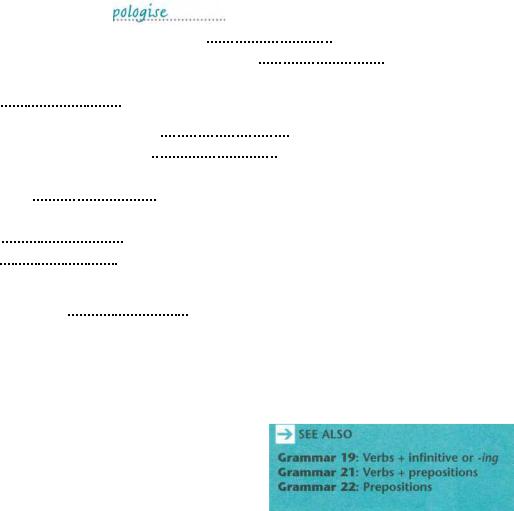
G R A M M AR 16 REPORTED SPEECH
OUsing the information in the e-mail as a guide, complete each space in the letter with a verb. The first letters of the verbs have been given.
TO: Roberts.hifi.co.uk
FROM: Dave@electricalsupplies.com
We are sorry that our computer ordering system went on the blink last week. Don't worry, the system is now up and running again, but we think goods will arrive 2 or 3 days late. I'd guess the goods you've just ordered should arrive round about Thursday. Thanks a lot for telling us about the problem with the ZP200. You'll be pleased to know the problem's been put right now. Re the exhibition you're organising, it seems you want to return any goods you don't sell. We're certainly interested, yes, but could I ask for more details before I let you know. Finally, just to tell you, as of 1st May our warehouse is now open 24 hours a day!
Dear Mrs Henderson, |
|
|
We would like to (1) a |
for the failure of our computer |
|
ordering system last week. Please (2) b |
reassured that the |
|
system is now fully functional again. It is (3) a |
that the |
|
goods ordered will be delayed by two or three working days. The |
||
(4) e |
arrival time for your latest order is Thursday. |
|
We are grateful to you for (5) r |
the defect in the ZP200 |
|
model. We are happy to (6) a |
that the defect has now been |
|
remedied. |
|
|
You (7) m |
the possibility of taking goods from us 'on sale or |
|
return' at an exhibition you are organising. We can certainly |
||
(8) c |
our interest, but we would like to |
|
(9) r |
further information before we commit ourselves to a |
|
decision. |
|
|
Please be (10) a |
that as of 1 May our warehouse is now open |
|
24 hours a day. |
|
|
Yours sincerely,
David Smith
103

Explanations
Basic uses of articles are assumed known.
Definite article |
• |
Classes |
|
|
This is one way to refer to classes, and is perhaps more formal than using a |
|
|
plural: |
|
|
The tiger is threatened with extinction. |
|
• |
National groups |
|
|
Groups as a whole: |
|
|
The French eat in restaurants more than the English. |
|
|
Single examples are not formed in the same way: |
|
|
A Frenchman/woman, an Englishman/woman. |
|
• |
Other groups |
|
|
If these are clearly plural: |
|
|
the Social Democrats, The Rolling Stones |
|
|
Note the difference: |
|
|
Pink Floyd, Queen (no article) |
|
• |
Unique objects |
|
|
the moon, the sun |
|
|
Note that there are other suns and moons in the universe. |
|
|
This planet has a small moon. |
|
• |
Titles |
|
|
These tend to be 'unique'. |
|
|
The director of studies |
|
|
If the title is post-modified (has a description coming after the noun), the is |
|
|
more likely, but not essential. Compare: |
|
|
She became President in 1998. |
|
|
She became (the) President of the United States in 1998. |
|
• |
Other titles |
|
|
The may be part of the title, and so is capitalised. |
|
|
Newspapers: The Independent, The Sunday Times |
|
• |
Musical instruments |
|
|
Jane plays the flute. |
|
|
The guitar is my favourite instrument. |
|
|
It is, of course, still possible to use a where it would naturally be used. |
|
|
There was a small brown flute in the window of the shop. |
104
G R A M M AR 17 ARTICLE S
•Emphatic use
This is heavily stressed and emphasises the following noun.
This hotel is the place to stay.
See also Grammar 14.
•Geographical names
The following use the:
Rivers: the Thames
Mountain ranges: the Alps
Oceans: the Mediterranean
Unique features: the Channel, the Arctic Compass points/areas: the East, the Middle East
Countries: collective or plural: The United Kingdom, The Netherlands
This does not apply to:
Mountain peaks: Everest (but The Matterhorn)
Continents: Asia
Countries: France
The definite article is sometimes used before Lebanon and Gambia:
The Lebanon The Gambia
•Place names
Post-modification, especially with ... o f . . . plays a role in place names.
Compare: |
|
Leeds University/The University of Leeds |
|
London Bridge/The Tower of London |
-» |
If the first part of a place-name is another name, then normal rules about zero article apply.
Brown's Restaurant
The Garden House Hotel
The same applies in geographical names:
Canvey Island
The Isle of Man
• Most and the most
Most hotels in England are very expensive, (making a generalisation)
This is the most expensive hotel in town, (talking about a specific hotel)
•Importance of context
The definite article refers to already mentioned items, and so its use depends on context.
The Smiths had a son and a daughter. The son was in the Army and the daughter was training to be a doctor.
On the Saturday, there was a terrible storm.
Here, the Saturday refers to a day in an area of time already mentioned.
On the Saturday of that week ...
105
A D V A N C ED LANGUAGE PRACTIC E
Indefinite article |
• |
Jobs |
|
|
|
Compare: Tony is a builder. Tony was the builder of that house. |
|
|
• |
In measuring |
|
|
|
Three times a week. Fifty kilometres an hour. |
|
|
|
£3.50 a kilo. £15,000 a year. |
|
|
|
Formally, per can replace a/an. |
|
|
• |
Unknown people |
|
|
|
Use of a/an emphasises that a person is unknown. |
|
|
|
A Mr Jones called while you were out. |
|
Zero article |
• |
Names |
|
|
|
Compare: |
|
|
|
Matthew Smith is one ofmy favourite artists, (a person) |
|
|
|
A Matthew Smith hangs in their bedroom, (a painting) |
|
|
• Some unique organisations do not use the. |
||
|
|
Parliament, but The (House of) Commons |
|
|
• |
Streets |
|
|
|
Most streets do not use an article. |
|
|
|
Green Road |
Godwin Street |
|
|
Exceptions are: |
|
|
^ |
The High Street |
The Strand |
|
|
and street names without preceding adjectives. Compare: |
|
|
|
Holly Drive |
The Drive |
Translation |
Study these sentences. Would you use an article in your language? |
||
problems |
I know how to use a computer. |
||
|
A pound and a half of cheese. |
||
I was holding it in my hand.
It's a film about homeless people.
Terry has flu. I've got a headache.
106
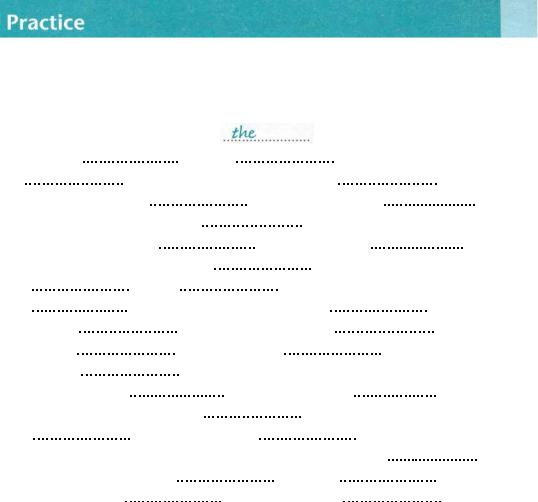
G R A M M AR 17 ARTICLE S
The activities include revision material.
In each space put a/an or the, or leave the space blank.
It has been announced that for (1) |
third consecutive month there |
|||
has been (2) |
rise in (3) |
number of |
||
(4) |
people unemployed, rather than (5) |
fall that |
||
had been predicted. (6) |
rise was blamed on (7) |
|||
continuing uncertainty over (8) |
|
government economic policy, |
||
and couldn't come at (9) |
worse time for (10) |
|
||
Prime Minister, who is facing (11) |
|
growing criticism over |
||
(12) |
way (13) |
|
present crisis is being handled. |
|
(14) |
MPs are increasingly voicing (15) |
fears that |
||
despite (16) |
recent devaluation of (17) |
pound and |
||
cuts in (18) |
interest rates, (19) |
government still |
||
expects (20) |
recovery of the economy to take three or even four |
|||
years. To make (21) |
matters worse, (22) „. |
number of |
||
small businesses going into (23) |
|
liquidation is still at |
||
(24) |
record level, and (25) |
housing market is |
||
showing no signs of recovery. Some backbenchers expect (26) |
||||
general election before (27) |
|
end of (28) |
winter |
|
unless there is (29) |
rapid change of (30) |
fortune. |
||
2Underline the most suitable option. A dash (-) means that no article is included.
a)Helen doesn't like the/- cream cakes sold in a/the local bakery.
b)The/- handball is fast becoming a/the popular sport worldwide.
c)We could see that the/— Alps were covered in the/- snow.
d)It's a/- long time since I met a/- lovely person like you!
e)Diana has a/- degree in the/- engineering from the/- University of London.
f)At the/- present moment, the/- man seems to have the/an uncertain future.
g)The/- problem for the/- today's students is how to survive financially,
h)The/- French enjoy spending holidays in the/- countryside.
i)Please do not turn on a/the water-heater in a/the bathroom,
j)Sue bought a/the Picasso I was telling you about the/- last week.
107
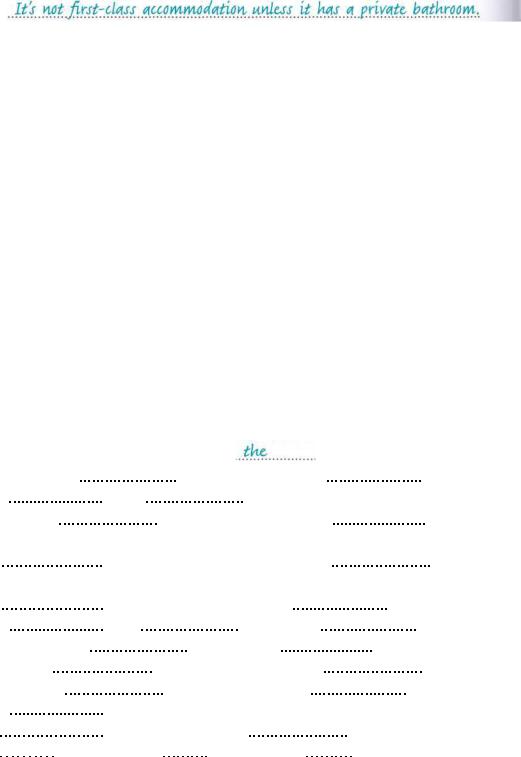
A D V A N C ED LANGUAGE PRACTIC E
Correct the errors in these sentences.
a)It's not a first-class accommodation unless it has a private bathroom.
b)On this record twins play piano duet.
c)The halfway through meal we realised what waiter had said.
d)If the Mrs Hillier phones, say I'm away on trip.
e)There is a wonderful scenery in eastern part of Turkey.
f)Cocker spaniel is one of most popular pet dogs.
g)There is going to be fog and a cold weather all the next week.
h)I spent very interesting holiday at the Lake Coniston in England.
i)We are against war in general, so of course we are against war like this between superpower and developing country.
j)The burglaries are definitely on increase.
In each space put a/an or the, or leave the space blank.
a) |
I'm going to stand for Parliament at |
next election. |
|||
b) When I left |
|
station, I had to stand in |
queue for |
||
|
|
taxi for |
long time. |
|
|
c) We took |
trip around London and saw |
Tower |
|||
|
Bridge. |
|
|
|
|
d) |
|
happiness of the majority depends on |
hard |
||
|
work for everyone. |
|
|
|
|
e) |
|
most main roads in this part of |
|
country follow |
|
|
|
line of |
roads built by |
|
Romans. |
f) |
Have you got |
|
latest record by |
|
Gipsy Kings? |
g) |
If I had |
time, I would like to take up |
|
archery. |
|
h) We spent |
pleasant evening having |
|
drinks at |
||
|
|
Robin Hood. |
|
|
|
i) |
|
Nile flows right through |
|
city. |
|
j) |
summer I spent in |
USA was one of |
|
best in my life. |
|
108
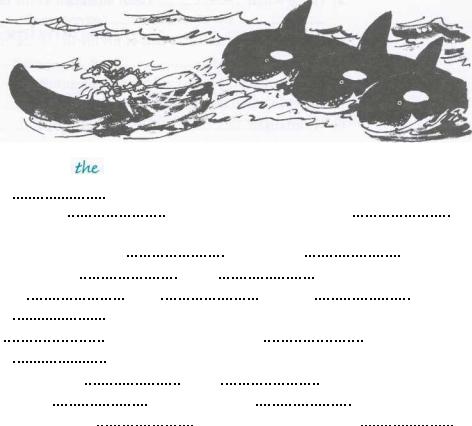
G R A M M AR 17 ARTICLE S
5 In each space put a/an or the, or leave the space blank.
a) |
She was |
first woman to cross |
|
Atlantic in |
|
|
|
canoe. |
|
|
|
b) Go down |
|
High Street and turn right into |
Mill |
||
|
Road. |
|
|
|
|
c) |
Please let me carry |
shopping. It's |
|
least I can do. |
|
d) |
I don't like |
|
milk in |
coffee. |
|
e) At |
end of |
busy day, |
sleep is |
||
|
|
best tonic. |
|
|
|
f) |
|
James Joyce I knew wasn't |
|
novelist and wasn't |
|
|
|
Irish either. |
|
|
|
g) We'll go for |
|
walk if |
sun comes out. |
||
h) This is |
last time I do you |
favour for a while. |
|||
i) |
I'm staying in |
|
Hilton so you can leave me |
||
|
message. |
|
|
|
|
6 There are ten extra appearances of the in the following text. Underline them.
The word processor and the calculator are without a shadow of doubt here to stay, and in the many respects our lives are the much richer for them. But the teachers and other academics are claiming that we are now starting to feel the first significant wave of their effects on a generation of the users. It seems nobody under the age of 20 can spell or add up any more. Even several professors at leading universities have commented on the detrimental effect the digital revolution has had on the most intelligent young minds in the country. The problem, evidently, lies with the automatic spellcheck now widely available on the word processing software. Professor John Silver of the Sydney University, Australia, said: 'Why should we bother to learn how to spell correctly, or for that matter to learn even the most basic of the mathematical sums, when at the press of a button we have our problem answered for us. The implications are enormous. Will the adults of the future look to the computer to make the decisions for them, to tell them who to marry or what the house to buy? Are we heading for a future individual incapable of the independent human thought?'
109
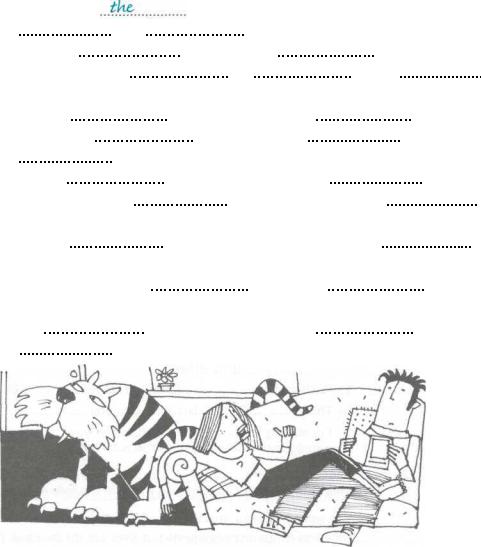
ADVANCED LANGUAGE PRACTICE
7 In each space put a/an or the, or leave the space blank.
a) Please watch |
|
cabin attendant as she demonstrates |
||
|
use of |
oxygen mask. |
|
|
b) |
Paul spent |
|
half of his life in |
Far East. |
c) |
You have to use at |
|
least |
pint and |
|
half of milk. |
|
|
|
d) Dick has |
|
sore throat and is taking |
medicine. |
|
e) We arranged |
|
accommodation on |
outskirts of |
|
|
city. |
|
|
|
f) |
There is |
|
very difficult crossword in ' |
Times'. |
g) |
Could you give me |
|
information I asked for in |
|
|
letter I sent you? |
|
|
|
h) I bought |
|
jewellery for my sister but it wasn't |
||
|
kind she likes, |
|
|
|
i) I always wanted to be |
astronaut but |
ambition |
||
|
wore off. |
|
|
|
j) |
And |
last of all, don't forget to put |
cat out for |
|
|
night. |
|
|
|
oUnderline the most suitable option. A dash (-) means that no article is needed.
a)Brenda is the/- ideal for a/the job. She has a/- wealth of the/- experience.
b)The/- safety at the/- work is a/- major concern for us.
c)The/- poorest people in the/- country live in this city.
d)Have you seen a/the new 'Hamlet' at the/- National Theatre?
e)There is a/- beautiful countryside within an/- easy reach of a/the hotel.
f)I have a/- terrible cold and am staying in the/- bed today.
g)I earn £3 an/the hour as a/- supermarket cashier on the/- Saturdays,
h)The/- charge for an/- excess luggage is £10 a/the kilo.
i)The/- most of the/- life is a/- matter of getting on with the/- others,
j)This country is officially called The/- United Kingdom of The/- Great Britain and The/- Northern Ireland.
110

Explanations
Defining and non- |
• |
Defining |
defining |
|
A defining clause specifies which person or thing we mean. It cannot be |
|
|
separated from the person or thing it describes. |
|
|
By 4.30, there was only one painting which hadn't been sold. |
|
• |
Non-defining |
|
|
A non-defining clause contains extra information. In writing it is separated |
|
|
by commas, and in speech, if used at all, is usually indicated by intonation. |
|
|
By 4.30, which was almost closing time, nearly all the paintings had |
|
|
been sold. |
|
• Some of the points given below depend on the type of clause. |
|
Which and that |
• |
These are alternatives in a defining clause, although which is felt to be |
|
|
more formal. |
|
|
By 4.30, there was only one painting that hadn't been sold. |
|
• |
That is not normally used to introduce a non-defining clause. |
|
|
The train, which was already an hour late, broke down again. |
|
• |
That cannot follow a preposition. |
|
|
It was a service for which I will be eternally grateful. |
|
• That is often used instead of who in everyday speech in defining clauses. |
|
|
|
Do you know the girl that lives next door? |
Who and whom |
• |
Whom is the object form of who and is used formally in object clauses. |
|
|
He was a person whom everyone regarded as trustworthy. |
•However, this is now felt to be excessively formal by most speakers and who is commonly used instead.
•Whom has to be used if it follows a preposition.
|
To whom it may concern. |
|
To whom am I speaking? |
|
However, in everyday use, it is usual to avoid this kind of construction. |
|
Who am I speaking to? |
|
See when and where on the next page. |
Whose |
This means of whom. It is used in both defining and non-defining clauses. |
|
Several guests, whose cars were parked outside, were waiting at the door. |
|
Several guests whose rooms had been broken into complained to the manager. |
Ill
